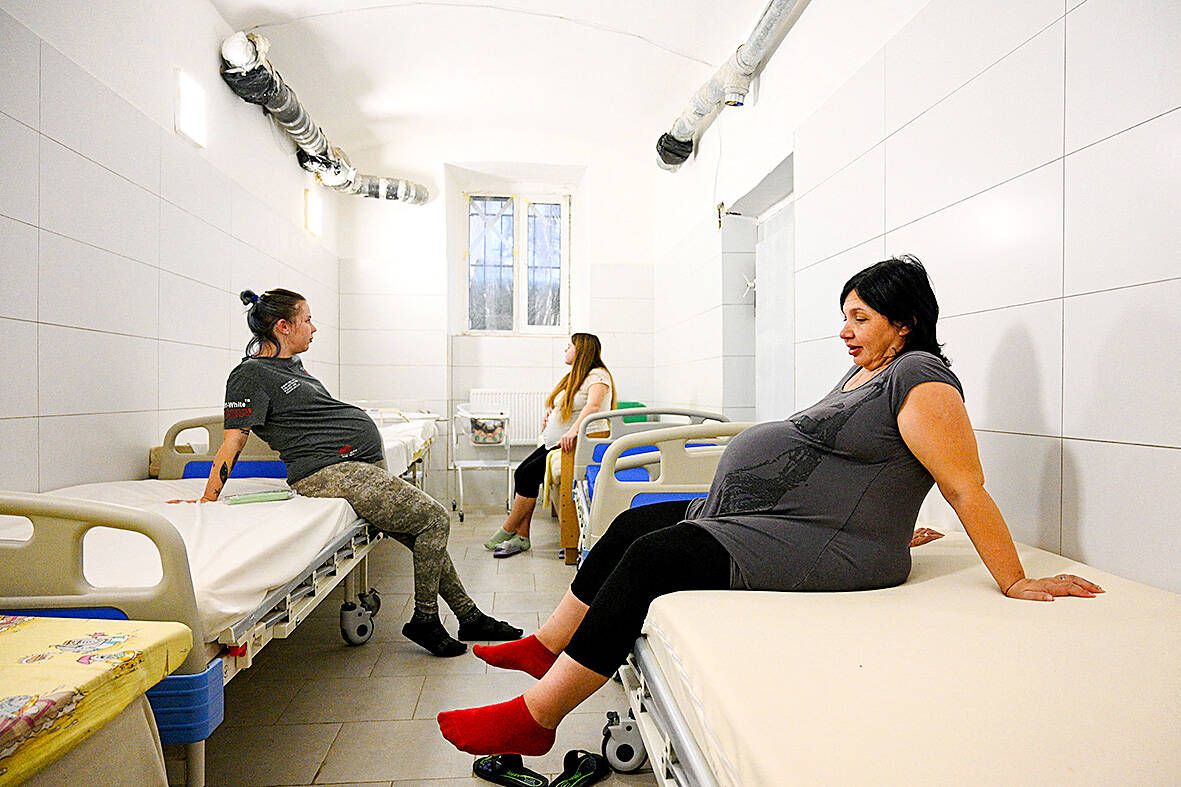Many women have painful periods, but only a handful of countries, most of them in Asia, allow them to take time off work to recover.
Change is in the air however.
On Thursday, MPs in Spain began debating legislation that would make it the first European country to offer menstrual leave. In several other countries, companies have started offering period leave without being legally required to do so. Here is a summary of the situation worldwide.

Photo: AFP
TAIWAN
The Gender Equality in Employment Act (性別工作平等法) gives women three days of menstrual leave per year, which are not deducted from the statutory 30 days of regular sick leave.
Women can only take one day in any given month.
Like sick leave, workers on menstrual leave receive only 50 percent of their salary.
INDONESIA
Indonesia passed a law in 2003 giving women the right to two days of paid menstrual leave per month, without giving prior notice.
But the provision is in practice discretionary.
Many employers allow only one day a month, while others give no menstrual leave at all, either because they are unaware of the law or choose to disregard it.
JAPAN
In Japan, a law dating as far back as 1947 states that companies must agree to give women menstrual leave if they request it, for as long as they need it.
It does not, however, require them to pay women during menstrual leave, but around 30 percent of Japanese companies offer full or partial pay, according to a 2020 labor ministry survey.
Not many women take advantage of the law, however. The survey of around 6,000 companies found that just 0.9 percent of eligible workers had taken menstrual leave.
SOUTH KOREA
In South Korea, women are entitled to one day of unpaid menstrual leave per month. Employers who refuse face fines of up to 5 million won (US$3,844).
A 2018 survey showed greater take-up than in Japan, with a little over 19 percent of women taking time off.
ZAMBIA
Zambia passed a law in 2015 allowing women to take a day off work during their period, without giving notice or supplying a doctor’s note.
While the measure is generally accepted and supported, not all employers willingly comply with the law on what is discreetly referred to as “Mother’s Day.”
But, encouraged by trade unions, women are starting to exercise their right, communications expert and women’s rights advocate Ruth Kanyanga Kamwi said.
SPAIN
Spain’s left-wing government in May unveiled a bill giving women unlimited paid leave for period pain, provided they have a doctor’s note.
Equality Minister Irene Montero vowed: “No more going to work with pain, no more taking pills before arriving at work and having to hide the fact we’re in pain that makes us unable to work.”
The proposal drew criticism from Spanish unions, who warn that, far from liberating women, menstrual leave could prompt employers to prioritize men when hiring.
COMPANY ‘PERK’
Some companies have not waited to be compelled by law to offer women menstrual leave.
They include Australian pension fund Future Super, Indian food delivery startup Zomato, and French furniture firm Louis which give respectively six, 10 and 12 extra days.
On its Web site, Los Angeles-based astrology company Chani also offers “unlimited menstrual leave for people with uteruses.”

On a hillside overlooking Taichung are the remains of a village that never was. Half-formed houses abandoned by investors are slowly succumbing to the elements. Empty, save for the occasional explorer. Taiwan is full of these places. Factories, malls, hospitals, amusement parks, breweries, housing — all facing an unplanned but inevitable obsolescence. Urbex, short for urban exploration, is the practice of exploring and often photographing abandoned and derelict buildings. Many urban explorers choose not to disclose the locations of the sites, as a way of preserving the structures and preventing vandalism or looting. For artist and professor at NTNU and Taipei

March 10 to March 16 Although it failed to become popular, March of the Black Cats (烏貓進行曲) was the first Taiwanese record to have “pop song” printed on the label. Released in March 1929 under Eagle Records, a subsidiary of the Japanese-owned Columbia Records, the Hoklo (commonly known as Taiwanese) lyrics followed the traditional seven characters per verse of Taiwanese opera, but the instrumentation was Western, performed by Eagle’s in-house orchestra. The singer was entertainer Chiu-chan (秋蟾). In fact, a cover of a Xiamen folk song by Chiu-chan released around the same time, Plum Widow Missing Her Husband (雪梅思君), enjoyed more

Last week Elbridge Colby, US President Donald Trump’s nominee for under secretary of defense for policy, a key advisory position, said in his Senate confirmation hearing that Taiwan defense spending should be 10 percent of GDP “at least something in that ballpark, really focused on their defense.” He added: “So we need to properly incentivize them.” Much commentary focused on the 10 percent figure, and rightly so. Colby is not wrong in one respect — Taiwan does need to spend more. But the steady escalation in the proportion of GDP from 3 percent to 5 percent to 10 percent that advocates

From insomniacs to party-goers, doting couples, tired paramedics and Johannesburg’s golden youth, The Pantry, a petrol station doubling as a gourmet deli, has become unmissable on the nightlife scene of South Africa’s biggest city. Open 24 hours a day, the establishment which opened three years ago is a haven for revelers looking for a midnight snack to sober up after the bars and nightclubs close at 2am or 5am. “Believe me, we see it all here,” sighs a cashier. Before the curtains open on Johannesburg’s infamous party scene, the evening gets off to a gentle start. On a Friday at around 6pm,